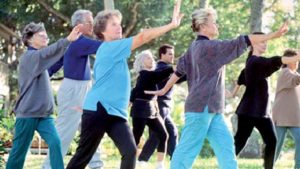Improve Brain Size and Function in Healthy Elderly with Tai Chi
By John M. de Castro, Ph.D.
“Epidemiologic studies have shown repeatedly that individuals who engage in more physical exercise or are more socially active have a lower risk of Alzheimer’s disease. The current findings suggest that this may be a result of growth and preservation of critical regions of the brain affected by this illness.” – James Mortimer
The aging process involves a systematic progressive decline in every system in the body, the brain included. This includes our mental abilities which decline with age including impairments in memory, attention, and problem solving ability. It is inevitable and cannot be avoided. Using modern neuroimaging techniques, scientists have been able to view the changes that occur in the nervous system with aging. In addition, they have been able to investigate various techniques that might slow the process of neurodegeneration that accompanies normal aging. They’ve found that mindfulness practices reduce the deterioration of the brain that occurs with aging restraining the loss of neural tissue. Indeed, the brains of practitioners of meditation and yoga have been found to degenerate less with aging than non-practitioners.
Tai Chi and Qigong have also been shown to be beneficial in slowing or delaying physical and mental decline with aging and to increase brain matter in the elderly. In today’s Research News article “The Effects of Tai Chi Intervention on Healthy Elderly by Means of Neuroimaging and EEG: A Systematic Review.” (See summary below or view the full text of the study at: https://www.ncbi.nlm.nih.gov/pmc/articles/PMC5915963/ ), Pan and colleagues review, summarize, and perform a meta-analysis of the 11 published research articles that examine the effects of Tai Chi practice on the brain of the elderly.
They find that there was 1 published study reporting that long-term Tai Chi practitioners have a thicker cortex in the brain. This is interesting but it cannot be determined if people who practice Tai Chi are simply people who have thicker cortexes. Other studies using functional Magnetic Imaging (fMRI) indicate that Tai Chi results in increased connectivity between brain structures and increased functional activity in the brain, so there is greater activity and signals are better sent from one area to another. Still other studies employing electroencephalographic (EEG) recordings indicate that Tai Chi produces greater electrical activity in the frontal areas of the cortex that are known to be involved in high level cognitive function (executive function)
One weakness in the studies is that the comparison groups are most often sedentary, not engaging in any exercise. As a result, it cannot be determined if the changes in the brain are due to Tai Chi per se or whether any form of exercise might have a similar effect. Future research should employ comparisons to groups performing other exercises.
Nevertheless, the results are encouraging; suggesting that Tai Chi can alter the brain in ways that may improve memory and cognitive performance. Significantly, Tai Chi practice is gentle and completely safe, can be used with the elderly and sickly, is inexpensive to administer, can be performed in groups or alone, at home or in a facility or even public park, and can be quickly learned. Also, it can be practiced in social groups without professional supervision. This can make it fun, improving the likelihood of long-term engagement in the practice. So, Tai Chi practice may be ideal for slowing or reversing age-related deterioration of the brain and the related cognitive decline.
So, improve brain size and function in healthy elderly with Tai Chi.
“The ability to reverse this trend with physical exercise and increased mental activity implies that it may be possible to delay the onset of dementia in older persons through interventions that have many physical and mental health benefits.” – James Mortimer
CMCS – Center for Mindfulness and Contemplative Studies
This and other Contemplative Studies posts are also available on Google+ https://plus.google.com/106784388191201299496/posts and on Twitter @MindfulResearch
Study Summary
Pan, Z., Su, X., Fang, Q., Hou, L., Lee, Y., Chen, C. C., … Kim, M.-L. (2018). The Effects of Tai Chi Intervention on Healthy Elderly by Means of Neuroimaging and EEG: A Systematic Review. Frontiers in Aging Neuroscience, 10, 110. http://doi.org/10.3389/fnagi.2018.00110
Abstract
Aging is a process associated with a decline in cognitive and motor functions, which can be attributed to neurological changes in the brain. Tai Chi, a multimodal mind-body exercise, can be practiced by people across all ages. Previous research identified effects of Tai Chi practice on delaying cognitive and motor degeneration. Benefits in behavioral performance included improved fine and gross motor skills, postural control, muscle strength, and so forth. Neural plasticity remained in the aging brain implies that Tai Chi-associated benefits may not be limited to the behavioral level. Instead, neurological changes in the human brain play a significant role in corresponding to the behavioral improvement. However, previous studies mainly focused on the effects of behavioral performance, leaving neurological changes largely unknown. This systematic review summarized extant studies that used brain imaging techniques and EEG to examine the effects of Tai Chi on older adults. Eleven articles were eligible for the final review. Three neuroimaging techniques including fMRI (N = 6), EEG (N = 4), and MRI (N = 1), were employed for different study interests. Significant changes were reported on subjects’ cortical thickness, functional connectivity and homogeneity of the brain, and executive network neural function after Tai Chi intervention. The findings suggested that Tai Chi intervention give rise to beneficial neurological changes in the human brain. Future research should develop valid and convincing study design by applying neuroimaging techniques to detect effects of Tai Chi intervention on the central nervous system of older adults. By integrating neuroimaging techniques into randomized controlled trials involved with Tai Chi intervention, researchers can extend the current research focus from behavioral domain to neurological level.
https://www.ncbi.nlm.nih.gov/pmc/articles/PMC5915963/
